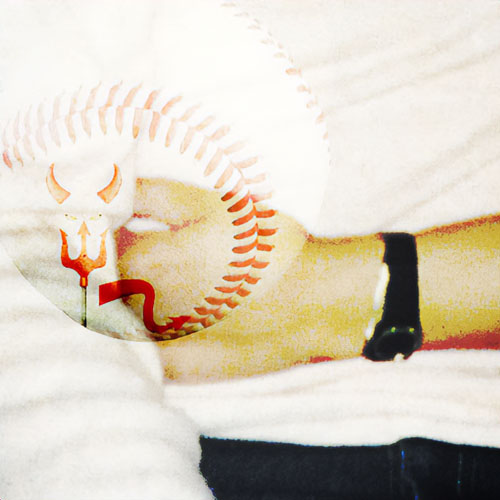Its side mirrors hung loose. it was a pathetic, slumping, three-wheeled metal cage with a driver’s seat in front and space for two passengers in the rear, above an engine held together with duct tape.
Six Ways to Murder A Rickshaw
Rickshaw No. 14 was decrepit, coated in cheap black house paint that barely hid the rust that had accumulated over more than 30 years. An investigation of the vehicle quickly uncovered a lack of mechanical upkeep: We found a broken speedometer and gas gauge, headlights and tail lights that failed to turn on, turn signals that didn’t blink, and an engine that protested the most minor duty with a high-pitched whine.
Sean, Eric, and I stood silently in the beach parking lot — 23 other rickshaws parked around us — as we contemplated our vehicle and the journey before us. We had precious few weeks of paid vacation each year, and we were spending two of them on 16-hour days of continuous driving, traveling more than 2,300 miles across the Indonesian islands of Bali, Java, and Sumatra. There was no prize money at stake, and the race organizers had emphasized that we had a low probability of successfully completing the rally, what with the atrocious condition of the vehicles, the lack of spare parts on the islands, and the general dilapidated infrastructure that is indigenous to Third World countries.
And that was the appeal: that we would break down and get stranded in the middle of the jungle on our way to the port city of Medan, an industrial metropolis that’s famous only for its pollution and traffic jams. It’s the sort of city that rational vacationers flee, not race toward. With the three of us firmly entrenched in the world of white-collar work, our lack of mechanical aptitude seemed to ensure that when we did break down, it would be disastrous. That made me smile. I like awful vacations.
It was for a good cause, of course. It was a charitable rally intended to help save Indonesian rain forests. And there we were, the American assholes who hadn’t raised a dime.
My addiction to discomfort began a decade earlier, in the Army. During a deployment to Afghanistan while serving in the infantry, I learned what humans are really capable of enduring: insufferable road marches at high altitude carrying 80 pounds of gear, or pulling guard duty in extreme heat and cold while dealing with sleep and calorie deprivation that would make most medical-school interns cry — all while living through perpetual attack from Taliban forces.
My working theory is that Afghanistan set the bar for deprivation: If I had gone three days without sleeping in Afghanistan, then for the rest of my life going without sleep for two days should be easy. And in the years following my discharge from the Army, I found myself falling into a pattern of taking self-induced abusive trips. While friends and family went on Caribbean cruises and flew to Las Vegas for getaways, I drove 10,000 miles through 19 countries from London to Mongolia in a 20-year-old, two-liter-engine Nissan Miera that I wouldn’t have entrusted to safely deliver my grandmother to the store. I backpacked through Lebanon, Central Africa, and Central America, and paid a quick visit to Antarctica to see what real cold felt like.
Eric and Sean were like me. They had risked their lives, spending small fortunes in the process, in the pursuit of risk, adventure, and discomfort. Given our collective past, the idea of failure never even crossed our minds.
It definitely should have.
It was early October 2012, and while the Indonesian capital of Jakarta was awash with angry Muslims burning American flags and effigies of President Obama in response to a You Tube video that had insulted the Prophet Muhammad, the locals in Bali, where the rickshaw teams were preparing to start the rally, were just laughing at an odd assortment of Westerners.
The Trident Thunderbolts — who arrived at the starting line an hour late — were massively hungover. Blowie, Sergeant Buzz, and Captain Stagg, Australian oil-rig workers who adventured together in the off-season, were dressed as old-time British explorers. The Wallace Monumental, a trio of fifty-something Scotsmen dressed in kilts, were life-long friends who had made a habit of these sort of expeditions — Kilimanjaro one year, Patagonia the next. So what if it had cost them a few marriages along the way? Then there were the two Spaniards starting a yearlong trip around the world, who admitted they had only enough money for two months; it was a shortfall they planned to make up by performing as street magicians and hypnotists.
Vicki, a cute British redhead working for the organizers, walked the length of the Iine of rickshaws, then waved her arms and blew an air horn, signaling that the adventure had begun. The rickshaws started pulling away like a herd of turtles. Hell, ours stalled out three times before the engine caught, emitting a high-pitched whine as it lurched onto the road. I glanced behind to see four teams still at the starting line, unable to get their vehicle started.
For some, the rally was over quickly.
The line of circus cars drove together through the city streets, weaving between Bali’s luxury hotels and trendy restaurants, but the flood of motorcycles and rapid-punch traffic lights quickly separated us from one another. Eric was driving as Sean and I high-fived in the backseat, sticking our heads out of the rickshaw as we waved at passers-by, exultant at beginning our adventure.
Just outside the city, we slowed to a stop after seeing a bright-orange rickshaw on the side of the road. Two Dutch girls stood with vaguely stunned looks on their faces as their rickshaw billowed black smoke.
We stayed with them for a minute, commiserating about how awful it was, before realizing that we could do nothing to help them. I’d later be told that they broke down 15 times just on the tiny island of Bali.
“The rickshaws started pulling away like a herd of turtles. I saw four teams unable to get their vehicles started.”
Back on the road, we laughed about how much it would suck to be having mechanical problems this early on. Just then Eric began to drive the rickshaw down a steep, winding road. A second later, he turned back to yell at us with a nervous grimace: “Uh, guys? I think the accelerator is stuck!” And then more decisively: “The fucking gas is stuck on!” Sean and I shared a look of quiet horror as we sped up exponentially. Exponential acceleration was a problem we didn’t know how to solve.
Eric reached down and pulled the gas pedal up from the floor, and the rickshaw slowed; he turned around with a reassuring laugh to explain, “When you’re driving, to ease off the gas, just lift the pedal off the floor with your hand, because it doesn’t bounce back automatically.”
Sean and I shared another look. This seemed like something that could have interesting implications for the two weeks of driving ahead of us. In the front seat, Eric pumped his leg vigorously before standing up to put all his body weight onto one of the pedals. He turned his head back around and added, “Brakes don’t really work either.”
The sun was setting as the rusted ferry docked on the island of Java. A newly married couple from Britain, glistening with sweat and a muted brown glow from the pollution on the road, explained that they had passed about a dozen broken-down teams in Bali. The way I figured it, natural attrition had already placed us in the pole position. We said good-bye to the honeymooners and re-entered the rickshaw as the ferry loading ramp started to lower. We were now on a massive 650-mile-long oval in the middle of the Pacific Ocean, just north of Australia. Whereas we had completed the island of Bali in a single day, we expected that Java would take the better part of a week.
Sean drove into the town of Banyu-wangi as evening began to steal over the jungle. Given our nonfunctional headlights, our driving time was limited to daylight hours. Whereas Bali had been all beaches and waterfalls;volcano-strewn Java appeared to be a curious mix of rural and industrial blighted poverty. The town’s only hotel cost ten American dollars a night, its beds not much more than plywood covered by thin cushions. There were no restaurants to get dinner, but we did find a roadside shack assembled from plywood and corrugated metal sheeting. Inside, the proprietor had plastic bowls of old meat being circled by flies. The glass display case was covered in grime. For drinking water, there was a plastic bucket of rust-colored water. This was pretty much representative of the meals that were available for the rest of the trip.
Eric and Sean briefly discussed it and concluded that cooking the meat would neutralize the bacterium, thus the grime was really just a matter of aesthetics. They ordered shrimp and barbecued chicken. I ordered white rice and a coke. That night, the end of day one, all three of us were making frantic runs to the bathroom, a condition that did not abate during our stay in Indonesia.
In the early hours of the morning, as I gripped the fetid toilet bowl, roaches scurrying beneath me, house lizards on the wall chirping above me, I realized, with dawning trepidation, that something was different from my previous adventure holidays. Specifically, my superpowers were gone.
Explaining my superpowers to those who haven’t served in a combat zone is a difficult thing. The short version is that the Army had given me powers of invulnerability. I had been transformed from the guy in high school always picked last for gym class to someone who was able to hammer out 97 push-ups at the drop of a hat. I was still tall and skinny to the outside world, but in the Army, I never got sick, I didn’t experience motion sickness or jet lag, I was able to go days without sleep, and when I did finally catch a nap, I could do it any time and anywhere, curling up on a cold floor or a rocky crevice just as if it were a plush down comforter.
But as I stared into the amber-stained toilet bowl, I realized that — just like that — my powers had gone. I was now sickly and ill. I felt tired and longed for comfort. The idea of so much accumulated discomfort waiting ahead on this trip made me anxious. Maybe it was because the Army was now seven years in the past, increasingly becoming less a part of my daily identity and more a distant memory. Maybe it was that I had just passed 35 years of age, that quintessential marker of middle age. In any case, my entire frame of reference for conceptualizing our trip had just shifted. I was no longer confident and excited about the prospect of spending the next two weeks on the road in uncomfortable conditions. The new feeling I was experiencing was fear.
On day three, it poured most of the morning. Since we didn’t have anyplace on the rickshaw to hide, we drove soaking wet. Sean played mangled blues riffs on his harmonica between lines of lament as Eric drove. “I’ve got the rickshaw blues so baaad!” Riff. “It’s raining in Indonesia, and we’re driiiving!” Riff. “I hate everything.” Riff.
Sean’s off-note melodies didn’t bother Eric or me for the simple reason that we couldn’t hear anything. This was the first of three horrible discoveries I had made by lunch the previous day. The audio vortex of wind and rain, horns from the other vehicles, and the perpetual whine of our engine forced us into a partitioned privacy; essentially we would be unable to communicate. When we had spoken about the rally before the trip, it had been imagined as a long drive in which we’d immerse ourselves in conversation and laugh at one another’s jokes, a grand reunion of old friends. Instead, we would be spending two weeks not talking.
“This rickshaw is rattling my brain!” Riff. The rickshaw was rattling all of our brains. Literally.
That was my second horrible discovery. Mild traumatic brain injury is caused by linear, rotational, or angular shocks to the brain that occur when the cerebrospinal fluid in your skull sloshes the wrong way inside the skull, leaving your brain unprotected. The Rickshaw Run forced a perpetual onslaught of linear, rotational, and angular shocks to our heads. With each of us more than six feet tall, we weren’t so much sitting in the rickshaw as folded carefully inside it, which meant that the bumps of the crappy highway smashed our heads onto the interior metal frame of the rickshaw every few minutes.
But I was more worried about my back. By the time I’d left the Army, I had been given the parting gift of degenerative disc disease between the L4-5 and L5-S1 vertebrae, a diagnosis which basically meant I had carried too much shit on my back as we had chased bad guys through the mountains of Afghanistan. This, in turn, had led to a habit of popping too many pain pills. The constant jarring in the rickshaw from bouncing up and down over each of the 46,000 potholes that littered the Indonesian highway system from Bali to our present location had offered my spine the very sort of rapid compressions that I was supposed to be avoiding.
But, back to my horrible discoveries: The third was that the equatorial heat was insufferable even in October, even if it was raining. The heat caused your T-shirt to cling tight to your body, soaked through with sweat, by 9 A.M. As we had each brought only a single change of clothes, we would be basking and fermenting in our own filth for two weeks.
Collectively, it all added up to what I imagine would be the most effective form of enhanced interrogation ever: 16-hour shifts crammed into an uncomfortable space while jostling up and down and getting beat around the head, while being exposed to repetitive white noise and extreme temperatures, while physically ill — all while maintaining a steadfast vigilance on the road, so as not to be run over by a fast-moving truck.
Eric pulled to the side of the road to stretch his legs. We all piled out of the rickshaw and ate some peanuts as we cast angry glances back at the instrument of torture, which we had taken to calling Death. Sean said it first: “This is the worst vacation I’ve ever taken. I don’t understand why we’re doing this.” He looked at me and added, “What are we trying to prove?” He wasn’t being sarcastic; it was a. sincere question.
None of us spoke, the justifications and motivations we had summoned just days earlier forgotten. We could not remember why we’d thought this was a good idea.
Later on day three, we met another rickshaw team on the side of the road. Their eyes were bloodshot, their voices haggard and weary. They explained that they had neither slept nor eaten for 48 hours. Their rickshaw had already required a new radiator and their engine had caught fire. “We thought about letting it burn,” they said with sly smiles.
By the end of day five, time had ceased to exist in any meaningful sense. Sean was at the wheel, listless and inert as a semi started to change lanes into the space we were occupying. Sean jerked to attention and pulled hard on the wheel, sending us skidding onto the gravel shoulder of the road as the rickshaw stalled out. These close encounters were becoming an hourly affair, far too routine. (We didn’t yet know it, but two other teams had been medically evacuated, one because a windshield shattered in the face of the driver after a collision, the other after driving off a mountain cliff due to faulty brakes.)
“Very soon Death would be dying, and that would mean we would have to bypass the laws of physics and drive for 28 hours each day to finish.”
The three of us sat in the dirt. For a long moment we simply appreciated the copious amounts of oxygen that exist when you aren’t behind a smog-spewing semi. Sean rolled out our ripped map of Indonesia and estimated the mileage left to go as I popped some pain pills. While our hours had been long, our distance traveled had been poor as we had found ourselves limping along in traffic, victim to the lack of infrastructure and a slowly rising standard of living that had seemingly left each of Indonesia’s 250 million citizens in possession of a scooter. Still, the distance left looked manageable — until we flipped the map over and realized that we had gone only a quarter of the way across Java.
And if we ever got off Java, we still had Sumatra to cover, an island of equal size that was supposed to be the “bad” island, where the roads were really fucked up and the going would get slow. Sean quietly folded the map, a despondent glaze coming to his face. I popped some more pills.
“There’s no way we can do it!” Sean yelled angrily. “We have too far to go. The only way we can do this is if we start doing some 24-hour days, two people sleeping, one driving, never stopping except for gas — and that’s if nothing goes wrong!”
Our eyes moved to our rickshaw. Death had been making more frequent painful noises every time we attempted to switch gears. Death had strange hoses hanging down from the engine that previously hadn’t existed. We all knew we were on borrowed time. Very soon Death would be dying, and that would cost us more time. That would mean we would have to bypass the laws of physics and drive for 28 hours each day to finish.
“I’m not doing too well,” I said to no one in particular. I hadn’t eaten much in the past few days and was noticing my already skinny frame starting to shed weight that I couldn’t afford to lose. Sean and Eric nodded in understanding. They had spent the past two days expunging fluids from both ends of their bodies, which had caused severe dehydration. They were also sleep-deprived, but that barely seemed to merit attention.
“Are we weaker than we were four years ago?” Eric asked, thinking back to our last adventure together.
“Yeah, it was just four years, but some years weigh more than others,” I replied. Middle age wasn’t a fucking joke. Motorcycles whizzed by us as we considered our options. We all wanted to quit, but no one said it.
We had purposefully chosen to participate in a horrible vacation.
If we had wanted peace, we would have gone to a beach, got drunk, and made love to our wives. Instead, we had chosen to escort this barely serviceable metal cage of death across a country. We were getting exactly what we’d wanted.
But it wasn’t fun anymore. I wondered, for the first time in my life, if this is what it meant to be a grown-up.
That night, I stared at the ceiling of another squalid hotel from my blanket on the floor. In the Army, we were taught not to quit. Those who fell out of runs or road marches were ostracized. Those who failed schools like Airborne or Air Assault were derided as weak. You were taught not to quit for good reason: You couldn’t give up in the mountains of Afghanistan. And that was my instinctual reaction: If I quit, I’m weak.
But then, a second thought, buried deep in my head, spoke up: You’re on vacation, asshole. Truth be told, I had been miserable on all my vacations.
I was perpetually re-creating the discomfort of the war on one vacation after another, like a PTSD victim trapped in reliving the experience. It was time to stop punishing myself.
I turned on the lights, waking Sean and Eric. They propped themselves up on elbows and squinted at me.
“I want to quit,” I said quietly. Eric and Sean nodded in concurrence.
It felt liberating to quit and we quickly woke and dressed, excited. Our first thoughts were of abandoning Death at our hotel and taking a taxi to the airport.
Abandonment, though, wasn’t an option. The rally organizers had wisely required a $1,600 security deposit to ensure a handover of their godforsaken vehicle at the finish line. And that was just the starting costs. If you didn’t finish, they also billed you for the cost of flying a staff member to wherever you had left the vehicle, staff that would then drive the rickshaw to the finish line so that it could be used by the next team in the spring. And we all knew they wouldn’t be busting their ass to get it to the finish line in two weeks. You didn’t bust your ass when you were on someone else’s dime. That bill could run into the thousands of dollars. That was money none of us had.
Sean leaned in close and whispered, “Let’s blow the fucker up!”
We spent day six at the hotel studying maps and discussing plans. We had realized that if the rickshaw could be driven, towed, or pulled to the finish line, we were responsible for it. But if it blew up, crashed over a mountainside, or was stolen, it wouId be written off, courtesy of the organizers’ insurance policy. We needed to fall into that second category.
We devised plans for “accidental” electrical fires, for our rickshaw to be stolen, and for crashes on steep mountain roads. Periodically, Eric would run out to the rickshaw in the parking lot to peer under the carriage at the gas tank and check things out. In the late afternoon, Sean and I drove around the edge of town, scouting out locations for a horrible accident that would almost kill three Americans while destroying Death. In total, we developed six different ways to murder our rickshaw. But each plan had too many weaknesses.
The discussion for planning the theft of a rickshaw went like this:
How would the rickshaw get stolen without the keys? We copy the keys, leave the copy in the ignition, park it in Jakarta, and wait for someone to steal it. But what if the police get the rickshaw back? How do we explain making a copy of the key? What if we just leave our key in the ignition? If the theft is our fault, does that violate the insurance policy? Also, why would anyone steal this thing?
Then there was the plan to stage an accident: Do we find a cliff and push it over the edge? What if the police reconstruct the crime scene and realize we’re lying? The police won’t do that. This is the Third World; they don’t have the resources or the skills. But what if someone sees us, some farmer in a field? We call the farmer a liar. But they put people to death here for all sorts of things. What if they catch us trying to commit fraud?
By the early evening, we had decided on nothing, made no progress, only grown progressively more ill. A sense of panic began to grip us. Then Eric shot up from the floor where he had been bashing a pillow over his head in mock rage. “Fuck,” he said.
“We just ship the goddamn thing. We just put it on a boat and ship the goddamn thing.”
Using iPhones and the weak, rogue Wi-Fi signal available at an odd angle in the hotel lobby, it took us only four and a half hours of Google searches to establish that shipping connections did exist between Surabaya and Medan. The next morning, we finished the drive to Surabaya and headed to the shore, shouting out to other drivers, “Which way to the ocean?”
We pulled to a stop in front of a travel agent, the travel agent called in a neighbor who spoke English, the English-speaking neighbor made some calls and gave us an address, and at that address we found a shipping company that would send our rickshaw to Medan for $600. They were eager to help us because they thought we were participating in the television show The Amazing Race, an assumption we didn’t correct. A young man from the shipping company let us follow him to the port, and everyone at the port was so amused by Americans loading a rusted-out rickshaw into a shipping container that we were given top priority and applauded by a small but enthusiastic crowd of well-wishers.
The three of us stood in the doorway of the shipping container, basking in the applause that we felt we’d earned, and just like that, for us, the rally was over.
We had a taxi driver take us to the most expensive Western hotel in the city. We lounged at the pool, had cheeseburgers for dinner, and massages after. We waited until before we went to bed to call Vicki so that we could increase our chances of not having anyone pick up the phone, as we explained that the rickshaw was enroute, but that she might have to drive to the docks to pick it up. (As it would turn out, not a single team would make it to Medan.)
A week later, at the airport, Eric asked what we thought of the idea of going to Iraq for our next vacation. Apparently, tourists are starting to return, and he thought it could be fun to get in there early, before it became a travel destination. Sean and I immediately agreed.
Technically, the original Penthouse Magazine story used the tagline, “This vacation-challenged writer and his buddies set out to race more than 2,300 miles in a broken-ass rickshaw. Things go about as well as you’d expect.” … Since meeting expectations tends to be one of the hallmarks of a successful life, we thought we could give you a quick overview on constructing a rickshaw of your own. Now if wake up one morning thinking, “Y’know, I think I should be a rickshaw today,” at least you’ll have a place to start. … You might at least have a cup of coffee and consider some alternative uses for your day, however.

























